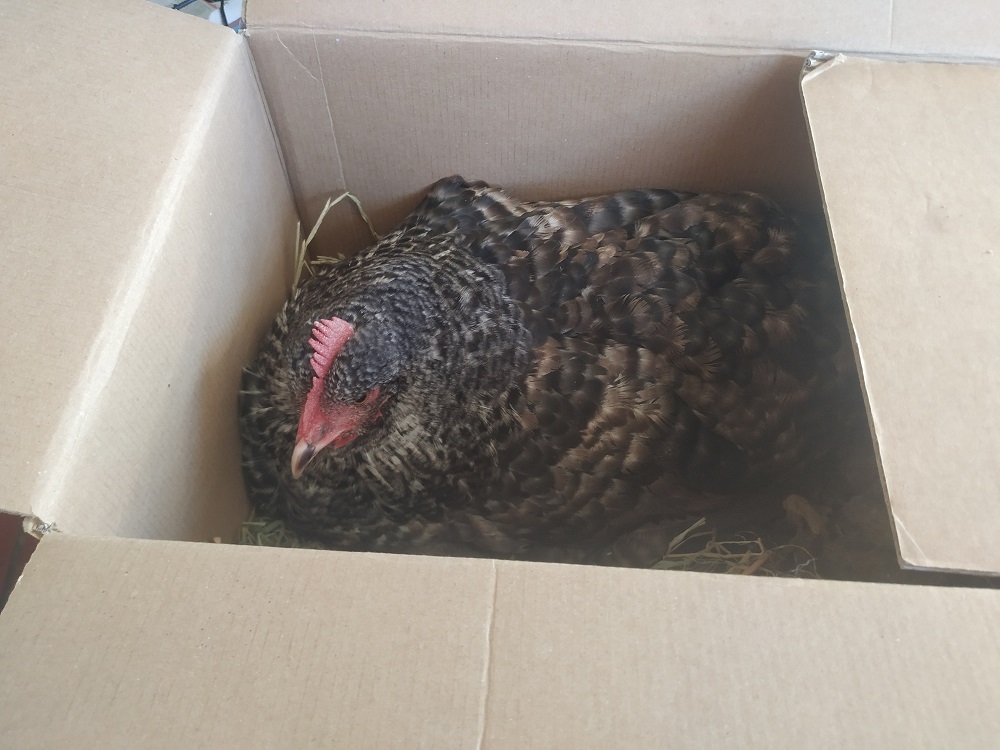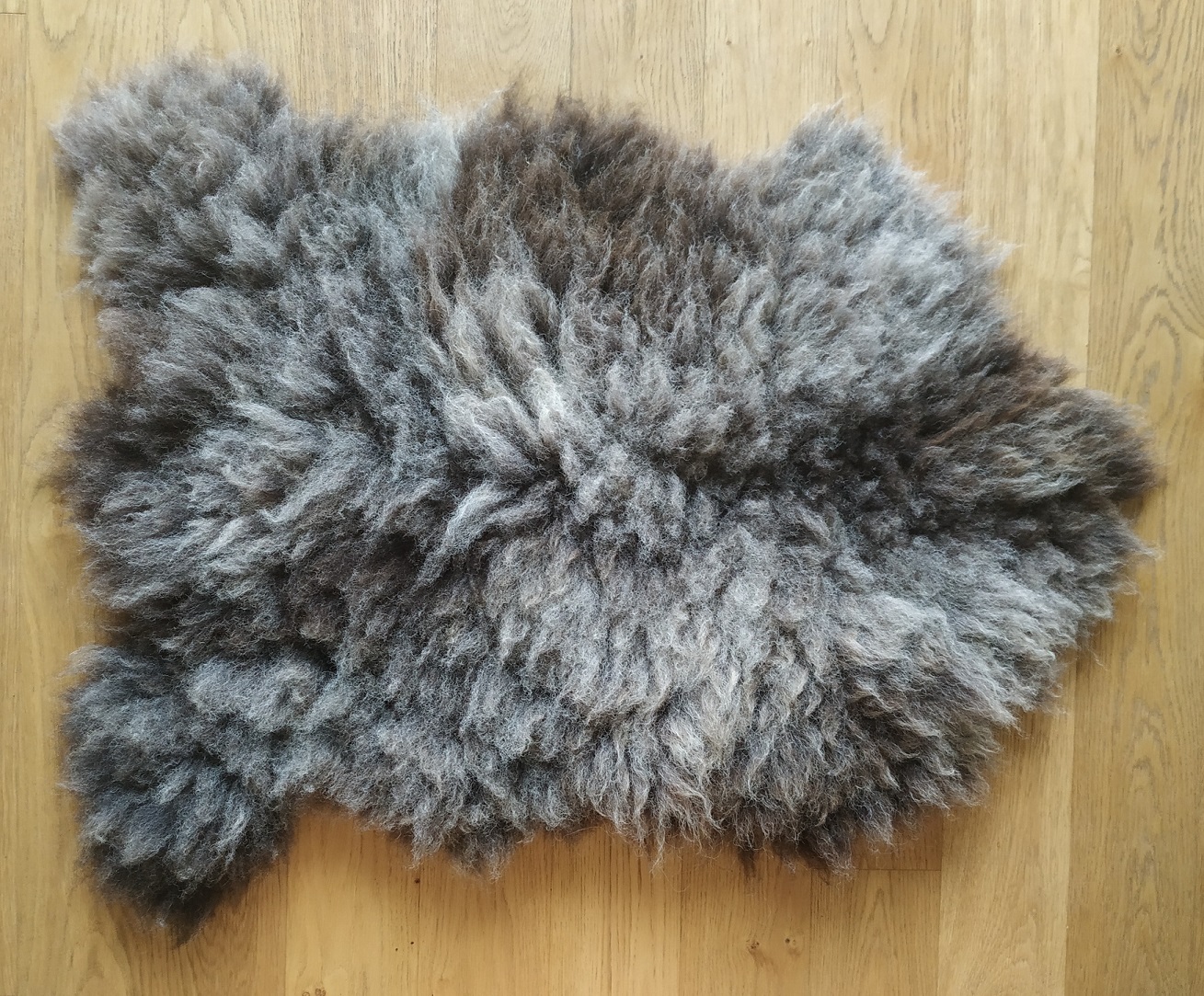
For a wee while now one of our elderly hen ladies, Pepper hasn’t been quite her usual self. The signs were subtle, in fact, there was only one sign, her tail feathers weren’t as perky as they usually are. We weren’t unduly worried because she’d gone through a hard moult in November along with the other hens. Hens can feel a bit depressed when they lose their feathers, particularly if the weather’s bad. We thought she’d perk up once her plumage grew back. We were also not too worried because she wasn’t displaying the usual signs of hen illness; her comb was a bright healthy shade of red, her bottom was clean and fluffy and she had a good appetite. She was also feisty (Pepper is second in command to Clippy the top hen), and she was still merrily bossing the other hens around along with Clippy and keeping order in the flock.
Then, one morning a couple of weeks ago I noticed Pepper wasn’t eating her corn. She was running in for it and claiming her position next to Clippy to get the biggest beakful, but she wasn’t actually eating any, just moving it around on the ground. Alarm bells ringing, I scooped her up and brought her indoors. The first thing I did was feel her crop, it should be empty first thing in the morning but Pepper’s was full and the size of a large golf ball. She was also quite thin. I was relieved and upset at the same time. I was glad to have found the source of her discomfort, but upset because an impacted crop would need operating on, and sod’s law, it was 2nd Jan, bank holiday in Scotland.
… within a few minutes I had Pepper in a box and Adrian was de-icing my car. Having spent three seconds philosophising about how these things always seem to happen at weekends, I’d rung the emergency vet and booked Pepper in for a crop op.
A crop operation entails a small incision into the crop and the offending blockage being removed. It’s done under a local anaesthetic and usually takes about 15 minutes.
Once at the vet’s we got started, I held Pepper in position and the vet got to work. When the crop was opened, we were both a little surprised to see only corn. No bailer twine, no ball of hay, no bunch of feathers. Truth be told we were strangely disappointed, we had expected a big plug of something to plop out, like pulling out a bunch of hairs from the plug hole.
We were a little mystified because Pepper should have been able to digest the corn in her crop, it was soft and should have been able to pass through into her gizzard without any problem.
Pushing that niggling worry into the back of my mind for the moment, I set off for home with Pepper stitched up and looking quite perky considering.
We put her in the kitchen by the aga in a dog crate and monitored her. The first thing she did was drink lots of water. That’s good we thought. Later that day, we offered her a tiny amount of softened chick mash in a mini cup which she ate and enjoyed.
The next day Pepper was looking perkier and we offered her a tiny amount of scrambled egg which again she enjoyed. Later in the evening she had some more softened up mash.

On day three it was sunny and relatively warm. After some thought over a cup of tea, we decided to put Pepper outside so she could be with her friends. It’s always a fine balance when taking care of sick animals, how much we intervene as humans is something we’re always considering. Hens are sociable creatures and we reckoned being with her friends would lift her spirits. Not only this, but hens love lazing about in the sun and it was a mild, sunny day. Indeed, as soon as we put Pepper out, she joined her pals for a catch up and a sunbathe and looked happy as can be. That evening Pepper was still looking happy and the weather was still mild so we thought we’d leave her to sleep in the hen house with the flock. We watched her go to roost and made sure she’d hopped onto a perch. Then we went indoors and had a cup of tea.

The following morning I went to check up on Pepper. I waited by the coops as the sun slowly rose. The auto-doors were set to open just before sunrise at 7.30am. As the doors opened I watched the hens come down the ladder one by one. All of them trouped out except for Pepper. My heart sank, quick as a flash I ran round the back of the coop and whipped the back panel off and there she was was, sprawled on the floor. I felt dreadful, what a terrible hen mum I am I thought as the tears started. But then I saw a small movement, Pepper was alive! I carefully picked her up and brought her back indoors. We wrapped her up in a blanket and then gave her breakfast, tiny bits of fat from last night’s slow cooked beef dinner, a small amount of porridge and a small amount of scrambled egg. Pepper quickly perked up and spent the rest of the day in the kitchen getting small amounts to eat and lots of cuddles.
Pepper continued to improve slowly, but as the days went by I started to get a little concerned that her crop wasn’t emptying as fast as it should be. She was going to the toilet (albeit on the runny side – post antibiotic tummy), but each morning her crop didn’t feel as empty as it should be.
Not having had crop problems in our flock before I made the mistake of googling “crop issues in hens”. Two things came up; impacted crop and sour crop. There was little else about crops not emptying except a brief reference to capillary worms which can affect the digestive system and stop things working properly. I pondered this info and by the end of the day I had convinced myself Pepper had gigantic capillary worms.
The following day and thinking more clearly I rang the vet for advice. I wasn’t convinced anymore about worms, Pepper’s comb was looking too healthy for there to be a worm problem. The vet and I chatted about Pepper and he told me that sadly only about 50% of hens with impacted crops get better. Out of the 50% who don’t respond to treatment the problem is usually due to something underlying like a tumour.

The vet also agreed it was unlikely to be worms, but that it wouldn’t do any harm to worm her. So we decided to give Pepper flubenvet in a little dropper every day, just to make sure. We’re also giving her probiotics (special ones for hens), and keeping her spirits up with regular cuddles and strokes.
We’re taking each day as it comes, fingers crossed for our dear hennie.





